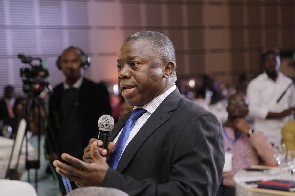Amid the ongoing economic struggles, Chief Alhassan Andani, the Executive Chairman of LVSafrica, has advocated a deliberate transition from a procurement-driven to a productive economy.
Key to his proposal is the crucial need for long-term patient capital, tax breaks and other incentives to enable domestic producers to enhance efficiency locally and eventually compete on the global stage.
Speaking at the Ghana Institute of Management and Public Administration (GIMPA) Business School’s Alumni Distinguished Lecture Series in Accra themed ‘So Many Entrepreneurs, No Enterprises: Unveiling the Ghanaian Entrepreneurship Conundrum’, Mr. Andani noted the importance of orchestrating viable enterprises to drive economic growth.
“I believe this was the rationale behind Kwame Nkrumah and our forefathers establishing state enterprises,” he said, referencing the event’s theme. “The intention was not just to confine ourselves to Accra or Tema, but to develop these enterprises into centres of excellence that could potentially expand across West Africa. At the time these enterprises were established, many other countries in the region lacked such initiatives.”
“I don’t believe this vision is lost. We now have competent individuals whom the state can engage with. We also have frameworks in place to facilitate the transition of these enterprises.
“For existing state enterprises, it’s time to reassess, refresh and repair them. If they are beyond repair, we should replace them. We need to reconsider the entire concept behind their establishment. Are their original ideas still relevant? Can we enhance and update them? And if they are dysfunctional, can we replace them? If they are beyond repair, let’s replace them altogether. Regardless, it’s imperative that we maintain our own domestic production capacity,” the former Managing Director of Stanbic Bank Ghana explained.
To address the rising unemployment situation, he noted the significance of maintaining domestic production capacity while incentivising businesses to scale up.
The SME trap
On small and medium enterprises (SMEs), Mr. Andani cautioned against solely focusing on their development, urging policies and strategic plans to transition them into multinational entities. He urged businesses to explore new markets, invest in research and receive deliberate state support to foster a conducive environment for enterprise growth.
“It’s good to have SMEs, but they should serve as a stepping stone toward a greater goal. I don’t want entrepreneurs to remain stuck as SMEs indefinitely. I want them to evolve and expand. There’s no limit to thinking small; so if an idea has the potential to solve a problem, it should be supported. We assist entrepreneurs in developing their ideas into efficient processes, employing the right tools, attracting talented individuals, expanding their markets and ultimately growing into multinational entities,” he reiterated.
For instance, the Ghana Enterprises Agency (GEA) has disbursed over GH¢65million to more than 800 SMEs between September 2021 to December 2022, underscoring its belief in the critical role of a vibrant SME sector in restoring macroeconomic stability.
However, Mr. Andani believes that insufficient funding is not the sole barrier to entrepreneurship, emphasising the need for well-conceived business ideas and a strategic plan for their elevation.
He also highlighted the disparity in entrepreneurial support, calling for more concerted efforts to navigate the business landscape and drive overall economic progress.
Drawing parallels with the success of industrial development in other countries, he suggested providing pathways for businesses to explore new markets and invest in research.
He also noted the importance of deliberate state action in creating a conducive environment for enterprise growth, which ultimately leads to broader economic benefits beyond individual companies.
The acting Dean of the GIMPA Business School, Ebenezer Adaku, assured of efforts to position the school as a hub for leadership and innovation.
He pointed out the importance of promoting collaboration and providing platforms like the Alumni Distinguished Lecture Series to nurture innovation and drive growth across various sectors.
President of the GIMPA Business School Association, Prince Kwabena Tafah, echoed Mr. Adaku’s sentiments, expressing confidence that the Alumni Lecture Series will contribute to the growth and development of the student body, society and the nation at large.
Business News of Thursday, 18 April 2024
Source: thebftonline.com

















